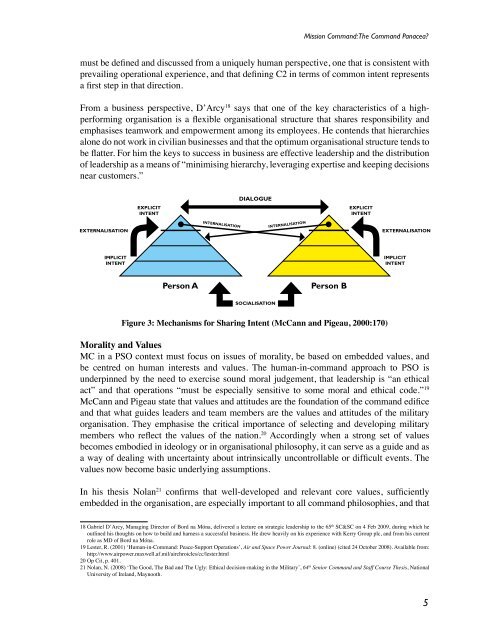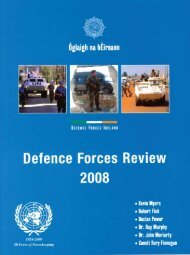Mission Command: The Command Panacea?must be defined and discussed from a uniquely human perspective, one that is consistent withprevailing operational experience, and that defining C2 in terms of common intent representsa first step in that direction.From a business perspective, D’Arcy 18 says that one of the key characteristics of a highperformingorganisation is a flexible organisational structure that shares responsibility andemphasises teamwork and empowerment among its employees. He contends that hierarchiesalone do not work in civilian businesses and that the optimum organisational structure tends tobe flatter. For him the keys to success in business are effective leadership and the distributionof leadership as a means of “minimising hierarchy, leveraging expertise and keeping decisionsnear customers.”DialogueEXPLICITINTENTEXPLICITINTENTEXTERNALISATIONINTERNALISATIONINTERNALISATIONEXTERNALISATIONIMPLICITINTENTIMPLICITINTENTPerson APerson BSocialiSationFigure 3: Mechanisms for Sharing Intent (McCann and Pigeau, 2000:170)Morality and ValuesMC in a PSO context must focus on issues of morality, be based on embedded values, andbe centred on human interests and values. The human-in-command approach to PSO isunderpinned by the need to exercise sound moral judgement, that leadership is “an ethicalact” and that operations “must be especially sensitive to some moral and ethical code.” 19McCann and Pigeau state that values and attitudes are the foundation of the command edificeand that what guides leaders and team members are the values and attitudes of the militaryorganisation. They emphasise the critical importance of selecting and developing militarymembers who reflect the values of the nation. 20 Accordingly when a strong set of valuesbecomes embodied in ideology or in organisational philosophy, it can serve as a guide and asa way of dealing with uncertainty about intrinsically uncontrollable or difficult events. Thevalues now become basic underlying assumptions.In his thesis Nolan 21 confirms that well-developed and relevant core values, sufficientlyembedded in the organisation, are especially important to all command philosophies, and that18 Gabriel D’Arcy, Managing Director of Bord na Móna, delivered a lecture on strategic leadership to the 65 th SC&SC on 4 Feb 2009, during which heoutlined his thoughts on how to build and harness a successful business. He drew heavily on his experience with Kerry Group plc, and from his currentrole as MD of Bord na Móna.19 Lester, R. (2001) ‘Human-in-Command: Peace-Support Operations’, Air and Space Power Journal: 8. (online) (cited 24 October 2008). Available from:http://www.airpower.maxwell.af.mil/airchroicles/cc/lester.html20 Op Cit, p. 401.21 Nolan, N. (2008) ‘The Good, The Bad and The Ugly: Ethical decision-making in the Military’, 64 th Senior Command and Staff Course Thesis, NationalUniversity of Ireland, Maynooth.5
<strong>Defence</strong> <strong>Forces</strong> <strong>Review</strong> <strong>2010</strong>moral development in soldiers must be made relevant to their daily working lives. He suggeststhat the DF should develop a core ethics doctrine. According to Nolan, “ethics seek to providea degree of order to the inherent tension between personal conscience, professional duty andconstitutional authority.” 22 In addition, he establishes that organisational morals and valuescan and must be inculcated by the leader, who, by personal example, fosters and creates theorganisational climate.Organisational CultureClosely related to an organisation’s morals and values is organisational culture. It can beargued that it is shared consciously and sub-consciously by its members and transmitted inthe same manner to new members. Crucially it is a leadership’s responsibility to create anorganisational culture and that by adopting MC philosophy requires a “change in culturegiven that MC is a complex command philosophy that to be effective must be accepted asa fundamental part of the everyday culture and climate of the Army.” 23 In turn this deliverschanges in culture and climate based on professional development and adherence to corevalues, whereby MC is as much a way of thinking as it is a way of doing.There is strong argument which suggests that culture can be stable over time but that it isnever static, and that crises sometimes force a group to re-evaluate some values or set ofpractices. The key cultural shifts required if MC is to be employed successfully include apermissive one “reinforced by the organisation being seen to reward appropriate behaviourand being seen not to punish the mistakes,” according to Stewart. 24 This permissive culture,which allows the exercise of initiative, is a requirement if MC is to be nurtured. It wouldtherefore be inappropriate to impose command doctrine top-down without ensuring that it isappropriate to the culture and capability of the organisation concerned. Vogelaar and Hans-Kramer 25 maintain that MC is hard to introduce unless the organisational culture changes toadapt to it, and advise that one should not underestimate the kind of organisational changerequired for MC to be accepted.A <strong>Review</strong> of the FindingsAs stated at the outset, this essay is based on a thesis which was submitted in part fulfilmentof the MA LMDS programme with NUI Maynooth. Hereunder the results which were yieldedfrom my personal research into MC:The Human-in-CommandThe human-in-command is the primary pillar of MC philosophy, reinforcing the views advancedby many of the leading military academics. Additionally, although MC philosophy is wellunderstood, espoused and partly operationalised, its application is inconsistent. Interestingly,and in contrast with some leading military academics in the field, my research concludes thatcentralised, hierarchical organisations, such as the DF, can accommodate and enable MC22 Ibid, p. 56.23 Lester, Op Cit, p. 16.24 Stewart, K. (2006) ‘Mission Command: Elasticity, Equilibrium, Culture, and Intent’ 22. (online) (cited 29 October 2008). Available from: http://pubs.drdc.gc.ca/inbasket/CEBsupport.061122_1521.TR-2006-254.pdf25 Vogelaar, L. and Hans-Kramer, E. (2004) ‘Mission Command in Dutch Peace Support Operations’, Armed <strong>Forces</strong> and Society, Vol. 30 (3), pp. 409-431.6
















